This year marks the third anniversary of the staging of a coup by the National Council for Peace and Order (NCPO). Cloaked in beautiful discourse of an attempt to “reform” the country and to tackle chronic problems, the NCPO has exercised its power to issue at least 584 Announcements/Orders and appoint the National Legislative Assembly (NLA) as its legislative instrument to promulgate at least 239 acts.
During the three years under the iron-fisted rule of the NCPO military regime, all mechanisms have been harnessed to create political culture that centralize executive power and grant sweeping and unaccountable power to the leaders without space for public participation. A legal culture, which the rule of law is disregarded by military-executive power, has been fostered through legislation process and law enforcement by judicial system. The media have been kept under tight controlled while independent organizations have been intervened and disrupted by the military. As a result, public officials are able to perform their duties with the culture of unchecked and unaccountable power.
It could be said that NCPO has transformed Thailand tremendously. The changes have been made unamendable when compared to the period before the coup. In each of the following issues, we are going to shed light on how such changes have been made to serve one common interest: the strengthening of power of the NCPO, which is vested with even more “stable,prosperous and sustainable” powers.
1. From public representation to a bureaucratic state
It could be said that the three years of NCPO rule has seen bureaucratic power flourishing by leaps and bounds. At least 78 agencies or committees have been established by the virtue of a series of Acts and the Head of the NCPO Orders. In each of these committees, the representation of public officials is over 57% on average.
The laws and orders issued during this period are geared towards decreasing the power of the people’s representatives while granting more power into the hands of unelected public officials. For example, the law concerning the National Broadcasting and Telecommunications Commission (NBTC) previously allowed civil society to take part in the selection of some NBTC committee members. Now, it has been altered so that only public officials have a role in the selection and the Senate would have the final say to confirm the positions.
Numerous laws reflect the centralization of bureaucratic power in managing natural resources. One of these laws is the Mining Act. The National Reform Committee led by former Prime Minister, Mr. Anand Panyarachun, used to attribute failures in ore resource management to the inefficiency of public regulators since mining has always been subjected to the control of the state. However, the revised Mining Act does not decrease the power of the state. Instead, it has increased the power of bureaucrats and they possess the majority of power in this newly promulgated Act.
Many laws which used to be proposed by public participation, after the revision by the NLS, now involve shrinking public representation. An example of this is the Justice Fund Act. In the previous version of the Act, which was drafted with input from civil society, the committee of experts consisted of at least eight representatives proposed by the people. However, the NLA revised the law to reduce the number of experts proposed by the people to only six out of sixteen while representation by public officials remains the same.
In addition, per the 2017 Constitution, the selection committee of members of independent organizations and the Constitutional Court shall predominantly consist of civil servants whilst independent organizations would have absolute and sweeping power to control the next elected government. At least six laws have been promulgated during this time to restructure the ministries and departments including the establishment of a new ministry, the Ministry of Digital Economy and Society (DE) and the allocation of public administration power to various new governmental offices.
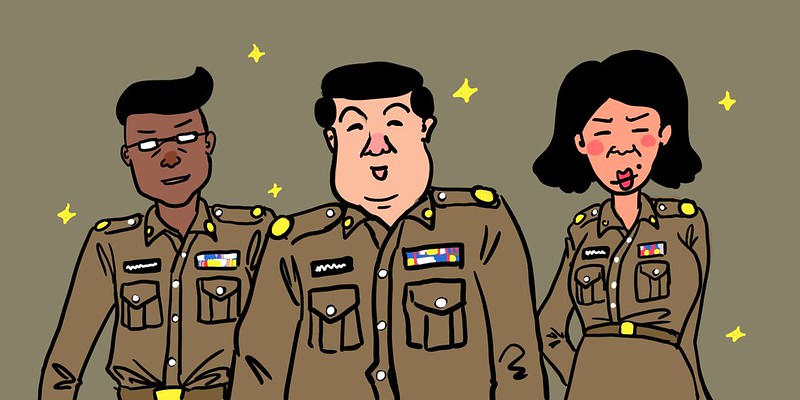
2. Arbitrary power to issue laws/orders at the expense of public participation
The modus operandi of the NCPO in ruling the country is opposite to the principle of public participation. Power vested in Section 44 of the Interim Constitution has often been invoked to issue at least 152 orders and it has been escalated arbitrarily by the Head of the NCPO. This includes the declaration of the Special Economic Zones in eight provinces and to allow bidding to be held prior to the completion of the Environmental Impact Assessment (EIA), amongst other orders. In this climate of fear, people find it difficult to express themselves and to meaningfully participate in the decisions that may affect their livelihood.
The drafting of the 2017 Constitution has shunned public participation and people have not been given a chance to express themselves prior to and during the drafting process. All the 21 Constitutional Drafting Committee (CDC) members have been selected by the NCPO. Similarly, the additional question in the referendum ballot has been solely proposed by the National Reform Steering Assembly (NRSA) and finalized by the NLA. The 2017 Constitution which just came into force imposes restrictions on the right to participate in political activities including the deprivation of the right to propose to have persons holding political positions removed from office, which used to be available in the 2007 Constitution.
The legislative process in the NLA, with more than a half of its members being military officials appointed by the NCPO, has been swift. At least 239 laws have been enacted without public consultation and without any representatives of the people sitting in the chamber to provide any opinion. When people challenged any law, they would be subjected to arrest and prosecution. This includes the individuals who submitted a letter of petition against the Draft Petroleum Act, and those who submitted a letter demanding changes to the Draft Fishery Decree in front of the Parliament.
The national reform is led by the NRSA whose members have been appointed by the NCPO. Even though, they have met for more than a year, the public in general is hardly made aware of the proceedings of the NRSA. The drafting of the National Strategy has been led mostly by a committee of military and public officials with barely any representatives from the people.
It could be said that during the three years, the NCPO has cited public commotion and political weariness as a reason to justify the issuance of a range of measures to diminish public participation. They have used this justification to exercise absolute power in public administration while leaving much of the public uninformed. People in this era are forced to wait for the decisions made by the NCPO and various agencies hoping that they would serve the interest of some of their interest groups. Such political culture is a part of the heritage that the NCPO is passing on to the next generation.
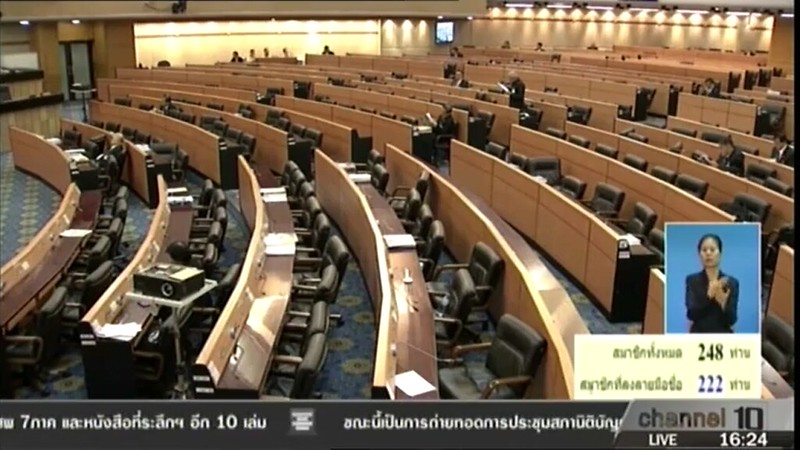
3. Freezing local administration organizations; thrashing the dream of decentralization
It is the aim of local administration to devolve power to the people whereby members of local administration bodies are elected by the local populace. This would enable local people to have a say in determining their way of life. However, the NCPO has actively disregarding the role of local administration bodies in making these bodies accountable to local communities. This has led to the disintegration of the institution of local administration.
Soon after seizing power, the NCPO has issued Announcement No. 85/2557 to suspend elections of local administration organizations, claiming that the current situation was unfeasible for elections. New individuals could be appointed to fill out vacant seats, with the Provincial Governors being the chair of the selection committee. As to members of the Bangkok Metropolitan Council (BMC), its members shall be selected by a committee led by the Permanent Secretary of the Ministry of Interior and other public officials. An addiitonal requirement instituted is that a person eligible to sit in local administration councils has to be a former or current public official at the level of C8 and upward.
Local administration power and public accountability has been diminished even more with the issuance of the Head of the NCPO Order No. 1/2557 which continues to “suspend” local elections, which means that existing members are allowed to stay in power indefinitely. Any empty seats would be occupied by persons vetted by the selection committee.
Another change to the selection procedure of members of local administration organizations has been made by the subsequent Head of the NCPO Order No. 22/2559. As the NCPO has refuted the idea that the selection committee led by the Provincial Governors was compatible with good governance, the selection procedure has been altered so that the Permanent Secretary of the Ministry of Interior now heads the selection committee instead. "Good governance", according to the NCPO, is therefore subject to the power of high ranking public officials and does not rest on the principle of local public participation at all.
The 2017 Constitution has even decreased public accountability in local administration organizations. Section 252 provides for a special appointment of leaders of local administration organizations through other channels, except elections. Similarly, the Head of the NCPO Order No. 64/2559 led to the removal of the existing Bangkok Governor and having him replaced by Pol Gen Asawin Kwanmuang as the new Governor.
The exercise of “freezing” power by the NCPO has brought an end to the dream of local people to meaningfully chart their own future. This harks back to the feudal era in Thailand when all the local rules were handpicked by the central power.
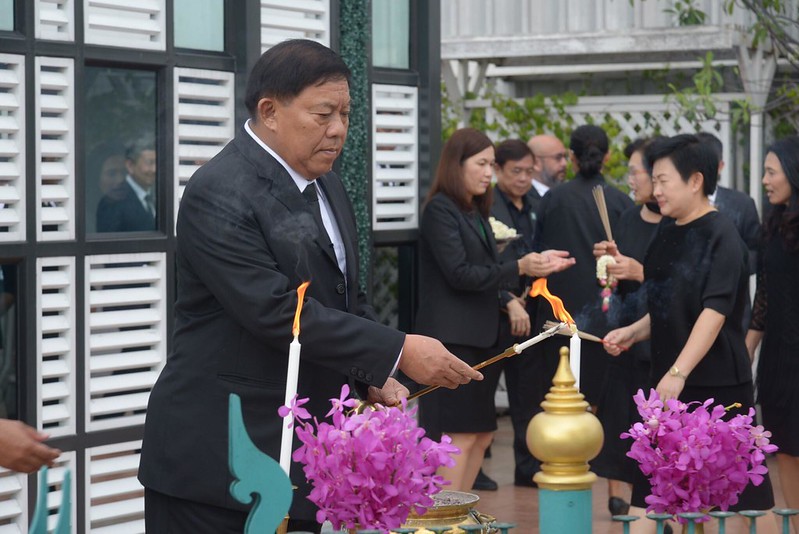
Picture from Facecook กองประชาสัมพันธ์ กทม.
4. Amendment of provisions concerning the King
After the NCPO regime has proposed the Draft Constitution for royal assent, the King has proposed that an amendment should be made to certain Chapters in the Constitution. As a result, the government had to amend the 2014 Interim Constitution to make it possible to amend the Draft Constitution after its adoption by the referendum. Amendments have been made to Sections 5, 15, 16,17, 19 and 182. Most of these amendments were concerned with the Chapter regarding the King including the appointment of civil servants appointed by the King and the Regent. Content in Section 5 has been reverted to the provision in the 1997 and 2007 Constitutions which states that “When no provision of this Constitution is applicable to any case, it shall be decided in accordance with traditional practices in the democratic form of government with the King as head of the state.”
After the passing of Somdej Phra Yanna Sangworn, the Supreme Patriarch on 24 October 2013, the new Patriarch has not been appointed immediately due to internal conflict in the Sangha Supreme Council of Thailand. Thus, the position of Patriarch has been unfilled for quite some time.
On 29 December 2016, the NLA approved the amendment of the Sangha Act, in three consecutive readings, which essentially states that the King shall have power to directly appoint the Supreme Patriarch and the Prime Minister can countersign the order instead of having to wait for an approval from the Sangha Supreme Council of Thailand and the countersigning of the Prime Minister as previously stipulated in the existing Act. In the revised Sangha Act, the order of seniority has also been removed as part of the criteria for the appointment of the Supreme Patriarch.
On 20 April 2017, the NLA reviewed the Draft Personnel Administration for Royal Service Act proposed by the cabinet. The proceedings of meetings have been shrouded in secrecy and relevant documents have been classified. The Act essentially provides for the transfer of civil servants for royal service from various governmental officers to an agency exclusively for civil servants for royal service and the cabinet is obliged to allocate funds to support these personnel who are engaged in royal service. Income from any enterprise dedicated to royal service shall not be sent to the National Treasury and the assets of the royal service shall not be subject to the execution of court order. No statute of limitation can be cited to make any claim for the assets belonging to the royal service.
5. Exercising sweeping law and power to tightly control conventional media-online media making them resort to self-censorship
On the day of its seizure of power in 2014, the NCPO has dispatched security personnel to various TV and radio broadcasting stations and issued a number of orders to seize control of the media and its news reporting , including the Announcement No. 4/2557. This Announcement requires all TV and radio stations to suspend their programs and to link broadcast from the Army TV instead. The Announcement No. 15/2557 has resulted in the termination of all satellite TV and community radio stations.
Although the NCPO has later relaxed these restrictions and allowed both TV and radio stations to resume their broadcasting, these stations have had to sign a MoU with the NCPO pledging to not disseminate any content that would “incite conflict”. All small community radio stations were forced to renew their licenses. As a result, most of them have decided to not resume their broadcasting up to the present day. Radio stations that have resumed their operations, are regulated by the Announcements No. 97/2557 and 103/2557 which have been issued by the NCPO to vet the content of the media.
The attempt by the NCPO to censor the content of conventional media including TV, radio and the press has not resulted in a spate of arrests of individuals who have violated its rule. Instead, the NBTC has been used as an important instrument to summon the media for dialogue, to reprimand, to fine, or to suspend its licenses. Five members of the NBTC are military officials. Penalties imposed on media include for example, the suspension of PeaceTV and TV24’s license for seven days in April 2015 and the suspension of VoiceTV’s license for seven days in March 2017.
Even though mainstream media is able to broadcast their usual programs, they have decided to adopt self-censorship by refraining from criticizing the NCPO for their own survival. The government’s muzzling of VoiceTV is an exemplary case that shows the expected retribution that the government will exact on the media. After being repeatedly reprimanded, fined and having some news anchors suspended as well as having the whole channel suspended recently, the executive board of the company has decided to overhaul its programs by purging all programs on political debate and analysis.
Even though mainstream media including TV, radio and print have been subjugated to absolute control by the NCPO, online media appears to be a new challenge for the coup leaders. This is an unprecedented challenge that previous military regimes in Thailand had never dealt with before. Online media has thus become a channel through which public figures including Chaturon Chaisang or Sombat Boonngamanong have been using to convey anti-coup messages.
The control of new media and the internet by the NCPO has faced major obstacles including a lack of legal tools to exercise their absolute power. They have managed to instill fear among internet users in making them feel unsafe if they want to express themselves. Apart from a cat-and-mouse approach to make the arrest of people who express their opinions online, the NCPO has adopted other methods to control new media including summoning Internet Service Providers (ISPs) for dialogue and requesting them to monitor information which could lead to unrest. The promulgation of revised new Computer Crime Act in December 2016 involves Section 14(1) (2) having been amended to expand culpability to online posting and the issuance of the Digital Economy and Society (DE) Ministry’s Notifications to ban communication among three persons and upward via Facebook and other social media platforms.
During the three years under the NCPO, both conventional media and new media have been forced to adopt self-censorship. They have to choose to convey the least sensitive issues. The longer the NCPO stays in power, the lower the ceiling for the so called’ “safe information” so much so that many of the issues that are worth reporting have been put into extinction due to self-censorship of the media.
An attempt to enact the Bill on the Protection and Promotion of Media Rights, Freedom, Ethics and Professional Standards, aka ‘Media Registration Law” is a major effort by the NCPO to impose control on media by forcing all media professionals including online media users to get registered with the Media Professional Council. A violation of this requirement would lead to three years of imprisonment. The Bill clearly reflects the NCPO’s interest and drive in restricting and muzzling the media.
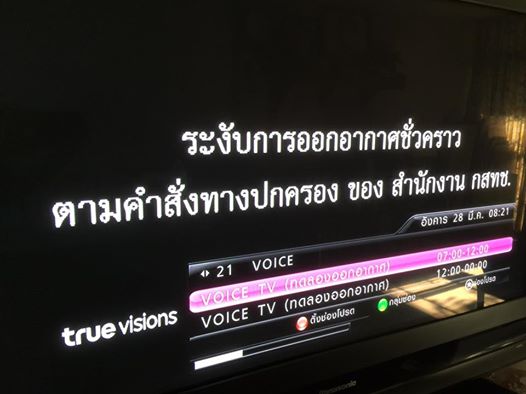
Picture from Sophie Tawan
6. Instituting military power in the justice process
A major phenomenon in the justice process during the three years under the NCPO is how military power has permeated every aspect of the justice process. In many instances, the military authorities themselves have reported cases to the police alleging that a crime was about to be committed and asked the police to conduct arrests and to prosecute them including the lèse majesté case against Burin or the ‘Vote No’ leaflets case against Samart.
At the investigation level, the military is authorized by the Head of the NCPO Orders No. 3/2558 and 13/2559 to conducts arrests and pre-trial detention of an individual in an undisclosed location for up to seven days. The interrogation can be jointly carried out by the military and the police against suspects the NCPO deems to have committed a crime. This includes the case of the eight administrators of the “We Love Gen’ Prayuth” Facebook page. All of the accused were arrested on 27 April 2016 and were held in custody and interrogated in a military barrack. One day later, they were charged with sedition (Section 116), amongst other charges. This is also evident in the case of Mr. Prawet, a human rights attorney, who was arrested at his home by the military on 29 April 2017 and was taken into custody at a military barrack for five days. He was then charged with violating Sections 112 and 116 of the Penal Code and the Computer Crime Act. In both cases, the individuals in question were deprived of their liberty and subjected to an interrogation without the presence of their lawyers and without access to their relatives.
Such incidences have ramification on the individuals being prosecuted and the justice process in general. For a person to be held in custody in a military barrack for seven days, it has made them feel that their security was under grave danger. The military has used threat, intimidation, persuasion and even the use of force to extract confessions to the charges and/or to give certain information. A case in point is what happened with Sansern, a suspect in the bomb hurled into the building of the Criminal Court in Bangkok. He was found to have sustain bruises and wounds on his body after being held in custody at a military barrack. During the three years under the NCPO, iLaw has documented at least 94 cases of individuals who had been held in custody at a military barrack before being pressed with charges, including the violation of Sections 112 and 116.
Judicially, the NCPO has issued the Announcements No. 37/2557 and 50/2557 which requires civilians facing alleged political offence or offence related to arms to stand trial in the military court. The cases are indicted by military prosecutors, and witness may include the military officials who had reported the case or who had conducted the arrest. Thus far, at least 300 individuals have faced trial in military courts for political offences, even though the Head of NCPO has issued Order No. 55/2559 end futhur trials of civilians in military courts. However, the Order is retrospective and any existing cases against civilians who have had to stand trial in the military court would continue as such.
The military has also engaged in penitentiary affairs as a temporary prison, the Nakhon Chaisri Prisone, has been established in the premises of the 11th Military Circle and 80 military officials have been appointed custodian.
That the military has power over the justice process during the arrest, questioning, trial and in prisons is a breach of the rule of law and international obligations that Thailand has to uphold the International Covenant on Civil and Political Rights (ICCPR) as a signatory state. The military also wields disproportionate influence in cases whereby they are a party to a dispute, typically involving individuals being arrested and prosecuted such as the cases against the anti-NCPO protesters. In such cases, the judicial institution is simply used as a cloak to hide the military’s political motives. This will result in the defendants and public in general losing their faith in the justice process. It might also lead to protracted conflicts in the long run which could not be easily resolved.
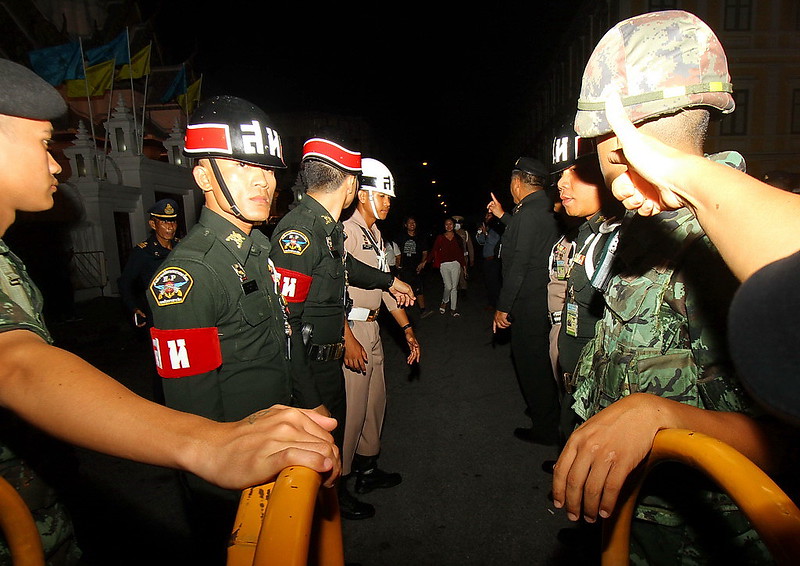
Picture from Banrasdr Photo
7. Independent organizations simply targeting the anti-junta groups
“Independent organizations” were first established by the 1997 Constitution. It was hoped that they would become entities independent from the government and would perform their duties to hold the government accountable for corruption, to serve the public interest and to safeguard people’s rights and freedoms from being violated by the state. Nevertheless, after 20 years, doubts remains over the independence of these organizations from the government since there have been instances that they have been intervened by the politicians who have ascended to power through elections or by coups.
During the three years under the NCPO, the problems regarding the independence of the independent organizations have become even more palpable. As the NCPO is exercising its administrative power, it also has the power to select the members of such independent organizations. For example, the selection of the “Auditor General” is conducted by a committee of seven members who are appointed by the NCPO. These seven members are mostly from the judiciary. Likewise, the selection of the “Ombudsman”, the members of the “National Human Rights Commission”, the “National Anti-Corruption Commission (NACC)” and the judges of the “Constitutional Court” are conducted by a selection committee, most members of which come from the judiciary and have to be approved by the NLA.
NCPO is capitalizing on this authoritarian period to strengthen its own power through various independent organizations. A large proportion of individuals who assume the leadership of these independent organizations are working and coordinating closely with the NCPO. This includes Pol. Gen. Watcharaphon Prasanratchakit who had resigned as a member of the NLA to be vetted as a member of the NACC, or Mr. Nakarin Mektrairat who, after completing his work to draft the first version of the new Constitution for the NCPO, has applied to be a judge in the Constitutional Court.
The independent organizations which are supposed to actively hold to account the government have become weak and have failed to hold the NCPO accountable. The results of investigations over allegations about corruption involving the military have often resulted in public outcry. This is clearly observed in the investigations by the NACC and the Auditor General which have led to a conclusion that the Rakabhakti Public Park project is clean and transparent. On the contrary, such independent organizations would be keen on holding to account the anti-junta groups. Their keenness has become excessive in some cases such as a proposal by the Auditor General to collect capital gains taxes from the former Prime Minister Thaksin Shinawatra (as he is accused of tax evasion).
Though it is still not certain as to how long the persons appointed to independent organizations or the Constitutional Court would stay in power, and whether their term would be subject to the old or new Constitution since organic laws have yet to be passed, what is certain is that the selection of new members of the independent organizations would still be subject to the Senate, who will be handpicked by the NCPO. In addition, the new members are able to stay in their position for as long as seven years, long enough to harbour support, uphold the rule of the NCPO, become a tool to hold an elected government accountable and to purge the elected government.
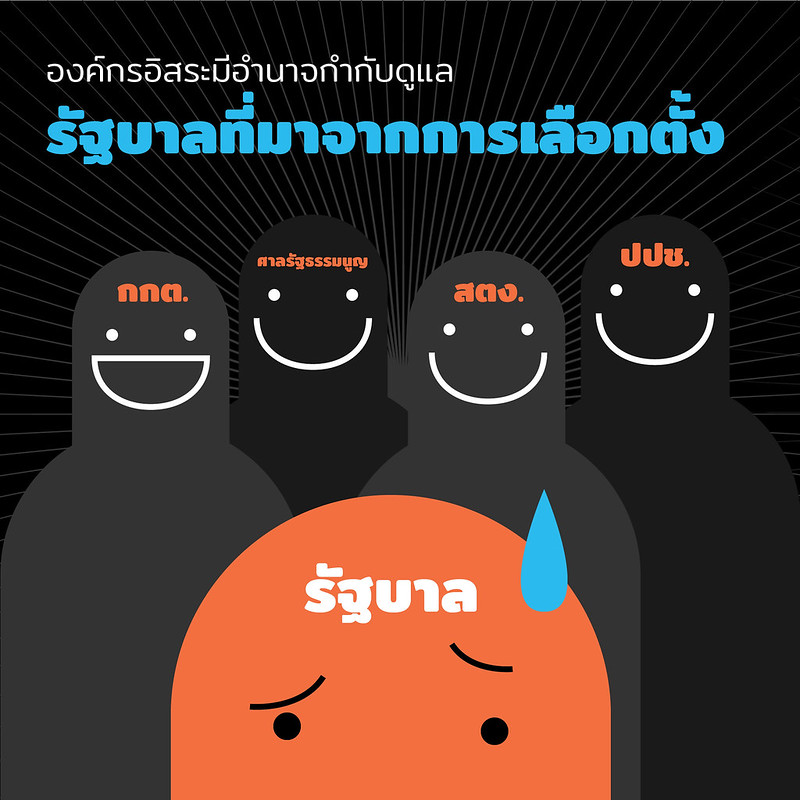
8. Entrenchment of unaccountable power
In the 2014 Interim Constitution promulgated by the NCPO, Section 48 provides for immunity of the NCPO for illegal offence(s) they have committed. The NCPO instituted this procedure by imitating the previous coup makers. Section 48 has had considerable ramifications. When people file a case with the Court alleging that the NCPO has committed a seditious act by seizing the power from the government, the Criminal Court simply dismisses the case by referring to Section 48.
The 2014 Interim Constitution also features Section 44 which authorizes the NCPO directly issue any order without consulting any other branch of government. The NCPO has invoked such power per Section 44 to issue at least four orders to impose restrictions on people’s freedoms and rights. In the orders, it also provides that officials who have carried out their duties per the orders by the NCPO shall not be held accountable. This double immunity also appears in the Head of the NCPO Order No. 41/2559 which authorizes the NBTC to regulate content in the media without being held liable, for criminal and civil offence and disciplinary action. The Head of the NCPO Order No. 3/2558 authorizes the officials to have power to conduct arrests and pre-trial detention of a suspect in national security cases for up to seven days. The Head of the NCPO Order No. 13/2559 on the suppression of influential persons and the Head of the NCPO Order No. 5/2560 on the designation of off-limit zones in Wat Phra Dhammakaya, all of these orders contain an immunity clause exempting the officials from any liability “should they perform their duties faithfully”.
One of the most obvious impacts of the invocation of Section 44 is the acceleration of the legislative process. However, this acceleration has resulted in the lack of prudent review and impact on stakeholders. An important case is when people asked the Administrative Court to revoke the Head of the NCPO Order No. 4/2559 which suspends the use of town- and city-planning law, the Court decided to not review the case claiming that an order issued through Section 44 of the Interim Constitutionชั่วคราว is lawful and constitutional and final. It seems power vested in Section 44 is above accountability and is not subject to checks and balances.
The top-down ruling power exercised in the past three years by the NCPO has led a political culture of public officials exercising absolute power without fearing legal repercussions since they are immune from judicial review. However, the people who are affected are left with no such protection. This culture of immunity shall remain in place even after the deaccession of the NCPO since the orders issued by them still remain applicable. This would reinforce the culture of militarism in Thailand.
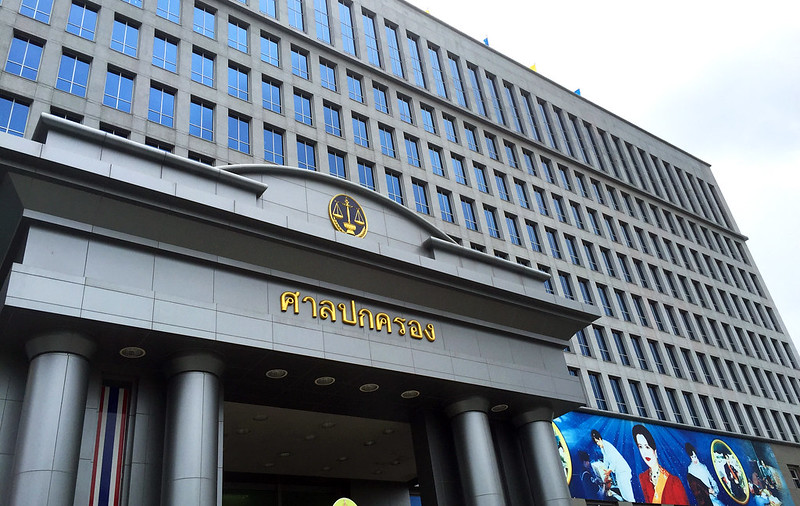
On the day that marks the third anniversary of the ruling of the NCPO and when the new Constitution has come into force, and more questions are being asked as to how to provide better safeguard people’s rights, how to provide for efficient checks and balances, and about the holding of the next elections to recruit people’s representatives to exercise power instead of the NCPO and to proceed as provided for in the Constitution.
However, the new Constitution drafted during the period of the NCPO provides for multiple mechanisms to protect their power. For example, the NCPO can appoint the first batch of 250 Senators, are able to develop a national strategy and reform plan, and require the new government has to act in compliance with ethical rules. Therefore, even though there are new elections and regardless of who would win the elections, the same military clique remains in power and have the political space to exercise their power through a variety of mechanisms. All the work that has been done during the time of the NCPO regime will remain applicable in Thailand for the foreseeable future.
